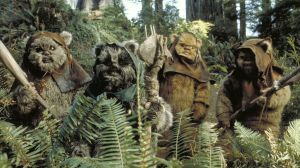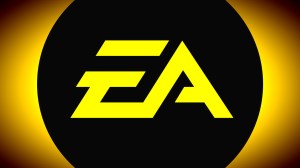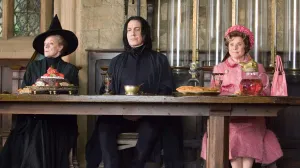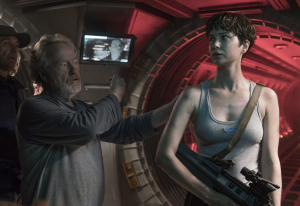This weekend, viewers were treated to the return of Jurassic World: Camp Cretaceous, the first television series set within the Jurassic Park franchise. The Netflix animated series follows a ragtag ensemble of children whose time at an adventure camp on Isla Nublar quickly goes awry, after the events of 2015’s Jurassic World leave them stranded on the island. The newly-released Season 2 takes that shocking set-up to new heights, all while weaving in unexpected connections to the larger Jurassic lore, something that grows more and more intriguing as the 2022 debut of Jurassic World: Dominion looms closer.
Videos by ComicBook.com
In celebration of Camp Cretaceous‘s return, ComicBook.com got a chance to chat with series executive producer and Dominion director Colin Trevorrow. We broke down the biggest moments from Season 2, how the series’ run could become a pivotal part of the overall Jurassic canon, and the unique experience of filming Dominion amid the COVID-19 pandemic.
Major spoilers for Season 2 of Jurassic World: Camp Cretaceous below! Only look if you want to know!

ComicBook.com: One of the things I really love about Season 2 is how it deals with such a dark situation, but the series doesn’t lose the sense of wonder and the approach of the story being about kids. What was it like to find that balance, when crafting the story for the season?
Colin Trevorrow: It was a bit more challenging in a lot of ways because the situation is so dire. As stakes get higher, it’s a little bit more difficult to have fun, as I think we’re all experiencing right now in our real lives. I honestly think there are a lot of parallels to what we’re all experiencing right now in a bunch of kids trapped on an island and trying to figure out how to survive.
In all of that darkness, I actually loved that the writers were able to always find moments for the kids to not forget why they care so much about dinosaurs in the first place. If one is in danger and they feel they need to be rescued, they need to know why on a deeper level. Not all of the emotion in our show relies on their relationship with dinosaurs, and it’s certainly about their relationships with each other. But part of it is that the dinosaurs are characters. That’s something that’s always mattered to me. I’m sure you could tell by watching the movies, too.
It feels like season one, the main conflict is really just the events of Jurassic World happening around the characters. In Season 2, the show introduces actual villains – Hap (Angus Sampson), Tiff (Stephanie Beatriz), and Mitch (Bradley Whitford), for the kids to deal with, and heightens how they approach their situations. What was it like to introduce those villains?
To me, it was a great representation of the values of the show. I think it’s been important to me to give kids a chance to see dinosaurs as real animals in our world, and along with that comes certain realities about how animals are treated. In [Jurassic World: Fallen Kingdom], animal trafficking is a major plot element. In this series, we have big game trophy hunters, and that’s not fiction. A lot of people heard about the American dentist who shot and killed a lion, and the people having their photos taken with animals they’ve killed. I know it’s dark, and yet I think it’s really important for kids to be aware of these things so they can make their own choices about what kind of world they’re going to want to have when they’re in charge someday.
One of the standout moments of Season 2 is when Ben and Bumpy come back, and we learn what happened to them. I was curious what the approach to that was, because it feels like the show really earns them coming back.
I thought it was a really smart, structural decision. It wasn’t mine. I wouldn’t say that about my own decision. The writers chose to have Ben’s story told in a single episode in the middle of the season. For the audience to be able to have him gone long enough to experience, along with the kids, what it was like for them emotionally to lose one of the members and be able to really dig into the emotion of that for many episodes, for really half the season. Then, once he’s revealed, to show how his survival was earned over all that time and show how he changed. I like all the episodes very much, but that one is my favorite, just because it’s so unique in allowing us to — largely without dialogue — follow the journey of this child as he totally transformed. I thought it was pretty cool.
Piggybacking off of that, is there a sequence or a scene in season two that is your favorite?
I think that would be it, really. The relationship of Ben to his own fear was my favorite sequence in the show, and reaching that point where you see Bumpy age and you see Ben change. I thought it was a pretty great transformation. We have a lot of story in the show, that was certainly the most emotional story.
What was it like for you, creatively, to approach what happens after the events of Jurassic World, especially in the main part of the park? It feels like you got to tell stories that you weren’t necessarily expecting to tell when you initially made the movie.
It was an opportunity, for the exact reason you just said. I was able to explore a time that is really compelling at that park that we, in a lot of ways, had to skip over in the movies. We didn’t return to Jurassic World until three years later when it had been completely overrun and overtaken by animals and returned itself to a somewhat natural state. Whereas in this show, you really get to experience along with these kids, what it was like for the dinosaurs to be abandoned on that island. They were in a zoo and they were used to being fed every day. They weren’t domesticated, but they weren’t wild. And so to see that transformation happen for the animals at the same time that it’s happening for the kids, I think is the strength of the season for me. I think it’s what I love about the writing.
I found it really fascinating that, at the end of the season, the kids are still on the island, and there’s a bigger threat being teased for Season 3. What can you tease about that direction, if you’re able to tell that story?
There is a larger story being told. By the end of season two, you can see that these kids are uncovering a mystery and a conspiracy that’s going to really send them into a much more dangerous world than they ever imagined. But what I love about season two is how even at the end, when they have realized that it’s possible for other people to get here, it almost makes it that much more painful for them that they’re still stranded. What I love about the end is that they take it on themselves. They’re not going to wait for anyone to help them anymore. It’s a bunch of kids who are going to band together, not just to survive, but to proactively find a way to rescue themselves.
Are there any other Jurassic stories that you would love to tell in animation?
What’s exciting is that this show has an opportunity for, I think, more than it may seem at this moment. The work that the writers have done and how we planned out where this can go… by the time we’re able to tell the story we want to tell, it really will become a tangent in its own right. These characters will have taken on an adventure that will be so different from anything any of the characters in the films have experienced. I think it’ll just take on value as it goes along, if we’re able to keep telling the story.
From a creative standpoint, how has your take on the Jurassic franchise evolved since Jurassic World?
It seems like so long ago to me. It’s been decades, hasn’t it? [laughs] what’s changed for me is — from the beginning, I knew that the mission and the reason why I felt like there was a story worth telling, is that we could expand the story to a place where it was about humans having to coexist with dinosaurs on the planet, in the same way that we do with animals now. That doesn’t mean riding them to the grocery store, because we don’t do that either. It means there are animals in the wild and there are animals in zoos and we have some domesticated pets, and we have this very complicated relationship. And they’re [being] hunted as well.
To be able to take us from where we were when Jurassic World began, to where we want to go, it really took two movies to be able to justify that in a way that felt grounded in a reality that we all share. Because I didn’t want it to turn into a fantasy series, and I still don’t. It’s just my own storytelling values when it comes to the franchise. I’m sure someday, someone who’s a kid now watching these movies will make the awesome “people riding dinosaurs with shotguns” series, and that’ll be cool and I’ll watch it when I’m old. It’ll be awesome, too. But this one, I want to keep a little closer to the world we know.
That ties perfectly into my next question, which is that Camp Cretaceous has the ability to be a gateway into the franchise for kids who might not necessarily be old enough to watch the movies yet. How does it feel to have the franchise now have this multi-generational aspect to it, where people who were fans of the movies are now showing them to their kids and they’re enjoying that together?
I’m moved by it, to be honest. I always knew that a new dinosaur fan was born every minute, but as kids grow up and decide that they want to know more about dinosaurs, not only are these films and this show here for them, but they’re all going to have a different experience going into it. When I was sixteen, you just had Jurassic Park. Now, I feel like they’re going to be brought into it potentially even through this show. So it’s important that this show has all of those same elements that Jurassic Park has. It has thrills and it’s scary, but it’s emotional. It’s about relationships and it’s funny, and it has that sense of wonder that you mentioned. In a lot of ways, it is a bit of a primer. It’s certainly not quite as violent as movies, because we recognize it’s younger kids who are watching it, but people aren’t safe either.
I’m sure you can’t say too much about Dominion, but I know a lot of fans are very curious about it, especially as production continued to move forward amid the pandemic. What has the process been like of working on the film in that kind of context, and having so much time going into it?
It’s unlike any experience I’ve ever had and probably ever will have. I lived with my cast for four months while we made this film and we all got to know each other very, very well. We were able to dig into the film and work on each of these characters in a way that I never would have had the opportunity to do. That kind of constant immersion is not really the way that films are made, where people are all living in their separate places and you see them on set.
It’s a very emotionally rich and thematically rich movie. It’s got a lot on its mind — because all of us did. And I think it understands each of these characters better than we ever have because each of these actors has been playing them for so long that they’re the ultimate authority on their own character.
Much in a way that I did on Safety Not Guaranteed, I really gave all the actors an opportunity to – in a lot of ways – do some writing, to really dig in and find the truth in each of these people. And the product of that is something that I never could have done alone. It’s pretty special.
***
The first two seasons of Jurassic World: Camp Cretaceous are now available to stream on Netflix.








